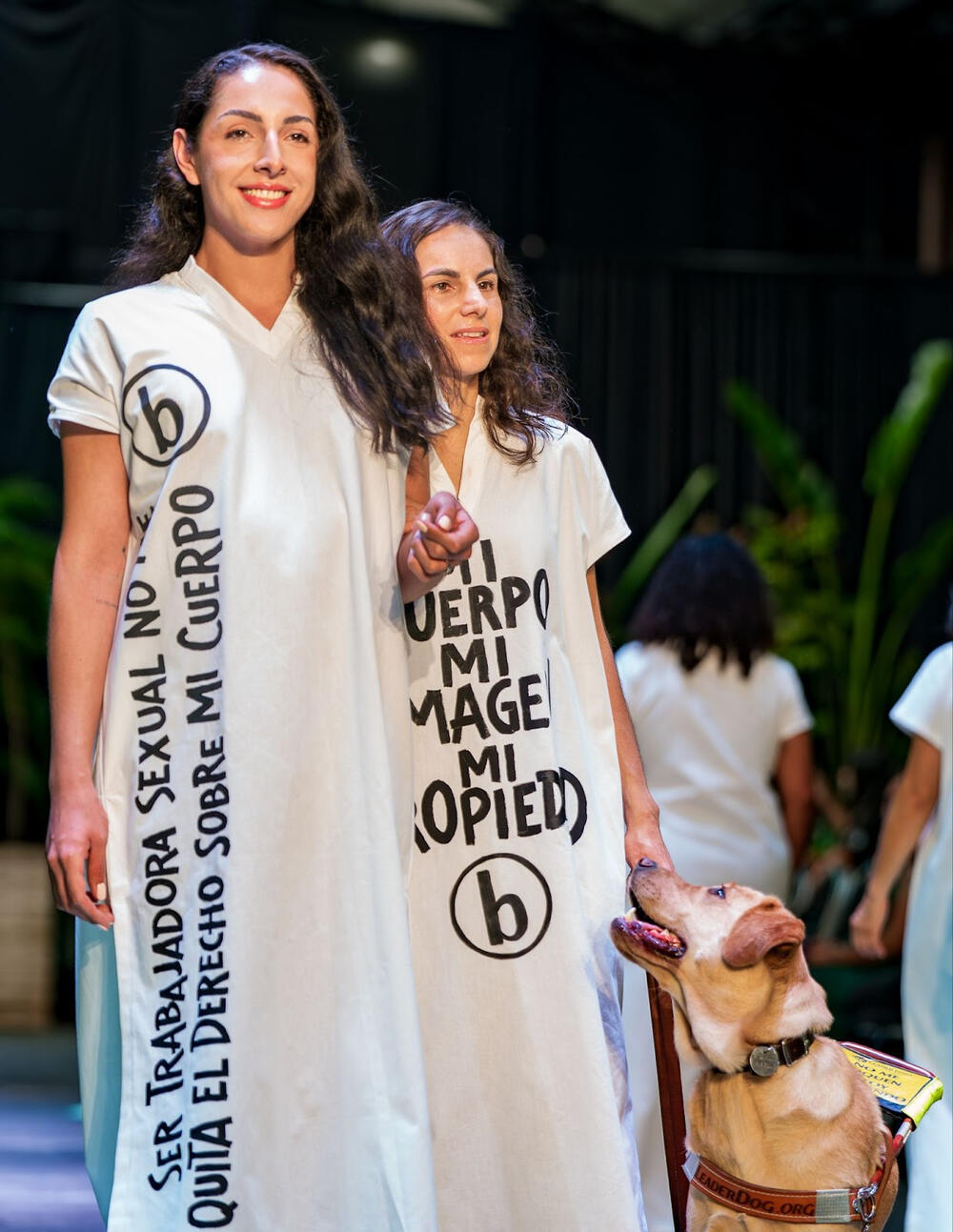News
Walking the walk: Activist Victoria Rovira Hernández takes a stand on Costa Rica’s ‘bodyright’ runway for trans people and sex workers
- 29 November 2023
News
SAN JOSE, Costa Rica – In August 2023, trans rights activist Victoria Rovira Hernández took to the catwalk for an unconventional runway presentation during Costa Rica’s fashion week.
The event featured a diverse group of models, all of whom wore long, white dresses emblazoned with personal statements, united by a common thread: Their advocacy for bodyright.
The bodyright campaign from UNFPA, the United Nations sexual and reproductive health agency, calls for the world to recognize and uphold the rights of women, girls and members of marginalized communities – including LGBTQIA+ people like Ms. Rovira Hernández – to bodily autonomy and to a life free from online violence.
For too many, this right is far from guaranteed. Around the world, LGBTQIA+ people remain highly vulnerable to gender-based violence at all levels of their lives.
Sexual and gender minorities across dozens of countries report being subject to physical attacks, police aggression, health-care discrimination and intimate partner violence; meanwhile, new research from the Centre for International Governance Innovation (CIGI) reveals trans and gender-diverse people stand at the highest risk for technology-facilitated abuse.
“Online violence can happen anywhere, to anyone, at any time. For individuals vulnerable to intersecting forms of discrimination, the levels of digital violence are even more extreme,” said UNFPA Executive Director Dr. Natalia Kanem in a statement launching the 16 Days of Activism against Gender-Based Violence.
“Online or off, all spaces should be free from gender-based violence.”
My body is my own

When Ms. Rovira Hernández walked the runway accompanying another model, she wore a dress that read: “Ser trabajadora sexual no me quita el derecho sobre mi cuerpo”, or, “Being a sex worker does not take away my right over my own body”.
As a sex worker herself, Ms. Hernández uses her platform to advocate for the rights of other sex workers, many of whom are trans people. In 2018, she co-founded the organization Colectiva Trans-Parencias, which works towards supporting these communities.
Sex work resides in a legal gray zone in Costa Rica. Without regulations on the industry, sex workers have few protections.
“Men in general already have this idea that the woman they align with belongs to them. And if they’re paying for your services, there’s a higher [sense of] entitlement,” Ms. Rovira Hernández said.
Globally, sex workers disproportionately face violence on the job. And as with any other industry, the emergence of new technologies has meant the onset of new challenges.
“I had a client at one point checking my phone; this was a person that had trust issues,” said Ms. Rovira Hernández. “It did get to a point where I had to block this person completely out of my life, and to this day they still send me messages.”
Beyond the risks of digital violence associated with sex work, research shows trans and gender-diverse people in general must contend with disproportionately high rates of technology-facilitated violence.
Two in three trans and gender-diverse people surveyed by CIGI said they had survived technology-facilitated abuse; nearly one in three reported the experience had a severe impact on their mental health.
“Being an openly trans person exposes you to certain forms of violence, and many of these occur in digital media,” Ms. Rovira Hernández said in a video for UNFPA’s bodyright campaign.
“We can't allow them to take away our rights, our power, our voice, through digital violence.”
Standing up and finding community
On the issues of the day, Ms. Hernández knows where she stands. “I’m very loud about the things I believe in,” she laughs.
“When people can’t argue with what I’m saying, they will attack me [for] being trans,” Ms. Rovira Hernández said. “When I’ve spoken about anti-racism – when I’ve called people out for being racist or fatphobic – they will look for ways to attack my identity.”
Despite attempts to silence her, Ms. Rovira Hernández continues to sound off online, sharing her thoughts and opinions with her thousands of followers.
“When I use social media, I don’t use it to educate people who don’t want to learn,” she said. “I use it to speak out and to find people like me, or who are looking for people like me.”
“My activism is about helping my community.”